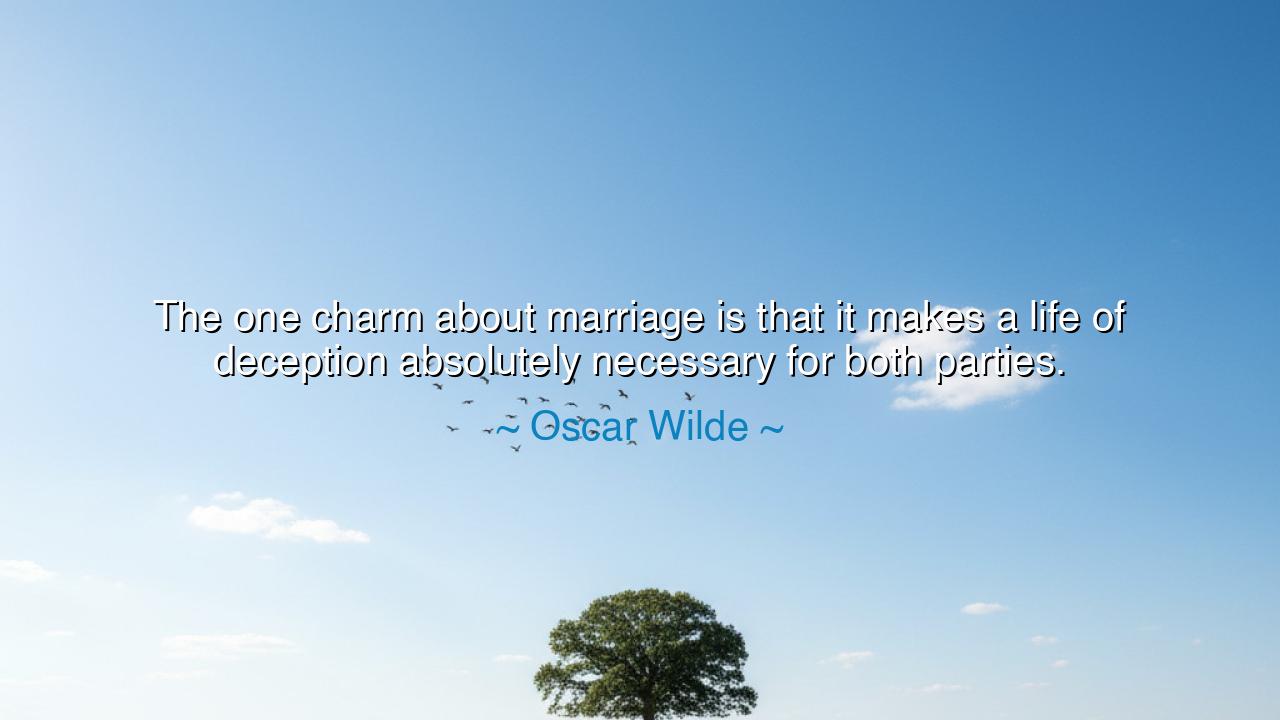
The one charm about marriage is that it makes a life of deception
The one charm about marriage is that it makes a life of deception absolutely necessary for both parties.






In the words of Oscar Wilde, that master of irony and truth cloaked in laughter, we find a paradox that stings and enlightens all at once: “The one charm about marriage is that it makes a life of deception absolutely necessary for both parties.” At first glance, it seems a jest—a cynical remark meant to amuse the weary of heart. But beneath the surface, Wilde speaks with the precision of a philosopher and the sadness of a poet. For he knew that marriage, that sacred bond exalted by society and scripture, is not merely a union of hearts—it is a delicate theatre where love and illusion must dance hand in hand, lest both collapse beneath the weight of truth.
To grasp the meaning of Wilde’s words, we must understand the nature of human love as he saw it. Wilde, ever the observer of society’s masks, believed that in the intimacy of marriage, two souls come so close that their flaws, their weaknesses, and their hidden selves can no longer be hidden. And yet, it is precisely this exposure that love cannot always bear. Thus, the lovers—consciously or not—begin the gentle art of deception: concealing harsh truths, softening words, pretending not to see what would wound the other. It is not malice that drives them, but mercy. In Wilde’s darkly gleaming humor, he reveals an ancient truth—that deception, in its mildest and most human form, is the veil that allows affection to endure.
Even the ancients knew this paradox. Consider the marriage of Odysseus and Penelope, one of the most honored in myth. When Odysseus returned home after twenty years of war and wandering, he did not at once reveal himself to his faithful wife. Disguised as a beggar, he tested her heart, her patience, her cunning. And Penelope, wise as he, deceived her suitors with promises never meant to be kept. Their love, their victory, and their survival depended not upon open honesty, but upon clever concealment—a harmony of trust and trickery. Thus, even in Homer’s tale, we see what Wilde would later cloak in wit: that in human bonds, truth and illusion must coexist, or the bond itself may break.
But Wilde’s deception is not limited to kind illusions. It also speaks of the masks that society forces upon men and women. In his own life, he bore the heavy disguise of conformity while hiding his forbidden loves in a world that condemned them. He saw, with piercing sorrow, that marriage often demands the same—from the woman who hides her ambitions to please her husband, or the man who suppresses his tenderness to appear strong. The charm of such deception, he suggests, lies in its universality—it reveals that even in love, humanity cannot escape the play-acting that defines social life. To be human is to wear masks; to be married is to exchange them daily with grace and restraint.
Yet there is tenderness in Wilde’s irony. He does not condemn the lovers for their deceptions—he smiles at them, forgivingly. He knows that total honesty can be cruel, that truth without gentleness can shatter what time has built. A husband’s silence, a wife’s smile, a kind falsehood whispered to spare pain—these are not betrayals, but offerings. Wilde’s “life of deception” is not a condemnation of marriage, but an acknowledgment of its fragility. It is the admission that to love another truly, one must sometimes protect them from the full weight of oneself.
The lesson in Wilde’s words is not that marriage is false, but that love requires art. Truth, like fire, must be handled with care, or it consumes what it touches. To live and love wisely, one must learn the balance between honesty and kindness, between showing one’s soul and guarding the peace of another’s heart. There is no virtue in brutal transparency, nor in cold deceit. The virtue lies in discernment—the wisdom to know when truth heals and when it wounds.
Therefore, my friends, if you would build a lasting bond, do not mistake deception for betrayal, nor truth for salvation. Know that even the strongest love needs a measure of mystery, as the earth needs shadow to sustain the light. Speak truth, but wrap it in compassion. Be honest, but never cruel. For Wilde’s jest conceals a profound commandment: the art of love is not in exposure, but in preservation.
And so, let the wise remember: the charm of marriage lies not in perfection, but in the shared illusion that love is eternal—and in the daily effort to make that illusion true. In the end, what Wilde called deception, the ancients might have called grace—the gentle lies that protect the truth of the heart.






AAdministratorAdministrator
Welcome, honored guests. Please leave a comment, we will respond soon